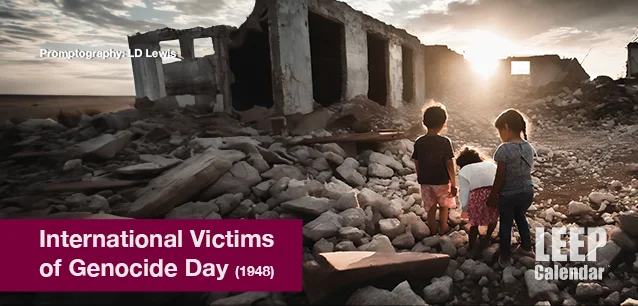 AD
AD
Today is: January 01
Scroll to explore events active on this date.
Additional Events on LEEP
LEEP INK FEATURES

August? Absolutely!
In August, we live through the Dog Days of Summer. It's hot and often humid, and those who can leave for better climates do. Down south, winter is in full force. August is also known as "the ...

In The Heat of July: July 2025 Events
Is it hot enough (or cold enough if you're below the equator) for you yet? There is actually a day for that! Like every month, I pick a diverse collection of events you may or may not know about. This ...

May Blooms: Events in May 2025
Along with October, May is one of the most densely packed months of the year. It's before the summer humidity and the last whole month of the school year. The weather is warming in t...
About International Genocide Victims Day
Legal , Civil Rights
Ends: Dec 09, 2023
DESCRIPTION:
International Victims of Genocide Day has the longest official name of any event in the calendar: International Day of Commemoration and Dignity of the Victims of the Crime of Genocide and the Prevention of this Crime. This day marks the adoption of the Convention on the Prevention and Punishment of the Crime of Genocide by the United Nations and its member states on December 9, 1948. The organization began observing this day in 2015.
The terms "massacre" and "genocide" both refer to extreme acts of violence, but they differ significantly in scope, intent, and legal definition.
Massacre—A massacre refers to a single event or series of events where there's a deliberate and violent killing of at least 50 individuals, though culturally, most mass murders are referred to as such today. Massacres can be politically, ethnically, or religiously motivated, or they can arise from other sources of conflict. A massacre occurs over a short period (hours or days) and may or may not have intent or premeditation. Massacres, when occurring during conflict or occupation, usually fall under war crimes.
Genocide—Genocide is a term that has a specific legal definition under international law for the large-scale intentional murder of one group of people by another. It denotes a systematic effort by one party to destroy, in whole or in part, a national, ethnic, racial, economic, or religious group of people. The excuses, propaganda, and manipulation used to justify genocide are irrelevant.
The United Nations defines genocide as any of the following acts committed with the intent to destroy, in whole or in part, a national, ethnical, economic, racial, or religious group, including one or more of the following:
While the act of genocide includes mass killings, not all mass killings are genocides; genocide requires explicit intent coupled with actions focused on murdering and eradicating the targeted group of people. Genocides can span weeks, years, decades, or even centuries and are a Crime Against Humanity, the worst crime possible under International Law.
International Human Rights Day is December 10. National Human Rights Week in the United States is December 10-17.
VIDEOS
Currently, this event does not have supporting videos.
SUPPORTING DOCUMENTS
Currently, this event does not have supporting documents.
ADDITIONAL IMAGES
Currently, this event does not have supporting images.
Where would you like to go now?
 AD
AD


/footer-logo.svg)
